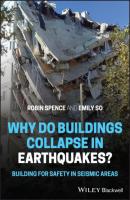Why do buildings collapse in earthquakes? Building for safety in seismic areas. Robin Spence
Чтение книги онлайн.

Читать онлайн книгу Why do buildings collapse in earthquakes? Building for safety in seismic areas - Robin Spence страница 3
Название: Why do buildings collapse in earthquakes? Building for safety in seismic areas
Автор: Robin Spence
Издательство: John Wiley & Sons Limited
Жанр: Отраслевые издания
isbn: 9781119619468
isbn:
4 Chapter 5Figure 5.1 Traditional adobe construction in Iran.Figure 5.2 Stone masonry construction with roofs of stone tiles, India, Cham...Figure 5.3 Progressive damage states for random rubble stone masonry buildin...Figure 5.4 Impulse Table testing of stone masonry houses in Eastern Turkey: ...Figure 5.5 Traditional unreinforced brick masonry.Figure 5.6 Progressive damage in unreinforced masonry construction; top left...Figure 5.7 Wall collapse in masonry building with timber upper floor and roo...Figure 5.8 Confined masonry construction, showing typical locations of confi...Figure 5.9 Confined masonry construction in Chile: detail of wall‐column int...Figure 5.10 Reinforced masonry construction. Typical reinforcing details.Figure 5.11 Reinforced masonry using concrete block masonry in Canada.Figure 5.12 Reinforced masonry construction for urban housing in Colombia, 2...Figure 5.13 Forms of reinforced construction. From left: concrete frame, inf...Figure 5.14 Soft‐storey collapse of reinforced concrete building, Kocaeli ea...Figure 5.15 Collapse of reinforced concrete shear wall structure, Conception...Figure 5.16 Modern Dhajji Dewari construction.Figure 5.17 Timber stud‐wall construction – general form and detail of corne...Figure 5.18 Typical forms of damage to timber stud‐wall structures. From top...Figure 5.19 Damaged timber‐framed building in Christchurch, New Zealand, in ...Figure 5.20 Damaged recently built timber‐frame building in Mashiki Town, in...Figure 5.21 Forms of steel frame construction. From left: moment frame, brac...Figure 5.22 Collapsed 21‐storey steel‐frame Pino Suarez building, Mexico Cit...Figure 5.23 Latino American Tower, Mexico City, in 2015. This landmark steel...Figure 5.24 Details of failed connections in steel‐framed buildings, 1995 Ko...Figure 5.25 Mean probability of a building of weak masonry exceeding each of...Figure 5.26 Vulnerability for building classes A–F, showing expected composi...Figure 5.27 Most likely vulnerability range (solid lines) and possible vulne...
5 Chapter 6Figure 6.1 Chart showing the causes of deaths from the casualty database. Bu...Figure 6.2 Flow‐chart showing the different causal factors to consider when ...Figure 6.3 GHI's evidence‐based guidance describes the process to use and th...Figure 6.4 Figure showing collapsed buildings in Balakot, Kashmir, after the...Figure 6.5 Sketches showing the movement of residents and their furniture im...Figure 6.6 Postulated changes in survival rate of occupants in different col...Figure 6.7 Flowchart showing the Cambridge casualty estimation model in coll...Figure 6.8 Catastrophic collapse of the five‐storey Pyne Gould Corporation (...Figure 6.9 Summary of the information provided by PAGER in its fifth release...Figure 6.10 Basic paradigm of linear regression models for earthquake loss a...Figure 6.11 Engineering‐based earthquake loss estimation approach.Figure 6.12 Flow diagram showing a multi‐severity casualty model framework p...Figure 6.13 Collapsed buildings where a few may have managed to escape or ge...Figure 6.14 Photograph showing the nine collapsed buildings of the WJ Comple...Figure 6.15 Diagram showing the physical locations of patients registered in...Figure 6.16 Sketches showing the differences in indoor volumetric reduction ...Figure 6.17 Casualty ratios for different collapse patterns of typical Japan...Figure 6.18 Sketches of different collapse mechanisms of a midrise reinforce...Figure 6.19 Relationship between fatality rates and IVR.Figure 6.20 Examples of photographs used for IVR analysis.Figure 6.21 Examples of photographs analysed for the peril of falling debris...
6 Chapter 7Figure 7.1 Retrofitted elementary school in Istanbul under ISMEP programme....Figure 7.2 School building in Nepal, before and after strengthening, 1998....Figure 7.3 Use of modified mould for rammed earth construction in Ecuador, 1...Figure 7.4 ‘Alien technology’ in reconstruction. Reconstructed houses in Ace...Figure 7.5 Graduate of the NSET mason training programme applies lessons lea...Figure 7.6 Artisan skill up‐gradation programme in Gujarat, India, 2019.Figure 7.7 Drop, Cover and Hold On graphic from the Great California Shakeou...Figure 7.8 Extract from Tokyo Metropolitan Government Manual on Earthquake P...Figure 7.9 Shock‐table demonstration to convince people of the effectiveness...
7 Chapter 8Figure 8.1 Soft storey timber apartment block in San Francisco, retrofitted ...Figure 8.2 Reduction in death rate (proportion of population killed in the z...Figure 8.3 Damaged reinforced concrete building in Christchurch after 2011 e...Figure 8.4 Reinforced concrete building on pilotis (Athens, Greece). This fo...Figure 8.5 CASE post‐earthquake housing system used in L'Aquila earthquake....Figure 8.6 Pre‐1977 reinforced concrete apartment block in Bucharest, showin...Figure 8.7 Strengthened school building, the İhsan Hayriye Hürdoğan Elementa...Figure 8.8 Damage to low‐rise masonry building in Newcastle, 1989 – still a ...Figure 8.9 Partially collapsed five‐storey restrained masonry building in th...Figure 8.10 Strengthened University building in Bogota, Colombia.Figure 8.11 Techniques for strengthening non‐engineered buildings in Indones...Figure 8.12 Partially collapsed building in Ahmedabad, 230 km from epicentre...Figure 8.13 Country comparison of estimated proportion of unsafe structures,...
8 Chapter 9Figure 9.1 Diagram showing the seven targets of the Sendai Framework for Dis...Figure 9.2 Visual showing the contributions by GEM's OpenQuake program.Figure 9.3 Cover page of the Homecoming cartoon, produced as part of a joint...Figure 9.4 The Japanese earthquake intensity scale depicted as a series of c...Figure 9.5 A furoshiki containing useful tips and information on disaster ri...Figure 9.6 Photographs taken of the live demonstrations of the earthquake de...Figure 9.7 Pablo Suarez explaining ‘Risk and Time: A Data Sculpture on Natur...
Guide
7 Index
8 Wiley End User License Agreement
Pages
1 iii
2 iv
3 ix
4 1
5 2
6 3
7 4
8 СКАЧАТЬ